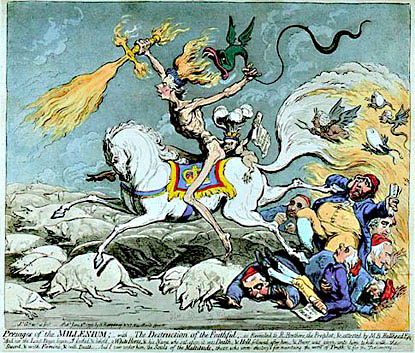
English 4/805B: Nineteenth Century Fiction:
Fiction of the Romantic Period
Fall 2002

Stephen C. Behrendt
319 Andrews; 472-1806
office: 10:00 -11:00 TR
and by appointment
James Gillray, Presages of the Millenium (1795)
Required Texts
Charlotte Smith, Desmond; or, The Young Philosopher
William Godwin, Things as they Are; or, The Adventures of Caleb Williams
Mary Hays, The Victim of Prejudice
Jane Austen, Pride and Prejudice
Percy Bysshe Shelley, Zastrozzi and St. Irvyne
Mary Shelley, Frankenstein; or, The Modern Prometheus
Anovel of your choice from the Corvey Collection at Love Library (see separate
instructions)
Aims of this Course
Ask someone to name some Romantic-era British novelists and they may name Jane Austen and Mary Shelley and then pause — and pause. Most people associate British Romantic writing with poetry, and yet the number of novels published and read during the period extends into many thousands. And it was not unusual for successful novelists to publish twenty or more novels. Moreover, the novel furnished an especially important vehicle for women writers, whose significant contributions are only now being fully recognized and appreciated by scholars and general readers alike.
Our primary aim will be to survey and sample the range and variety of Romantic prose fiction in order to consider how that body of writing relates to – and reflects and perhaps influences – social, political, economic, intellectual, cultural, and historical changes in Britain during the volatile period spanning roughly 1780-1835. Part of our work will involve studying the contents of the Corvey Collection of Romantic-era literature at Love Library, to give us all a clearer sense of both the numbers and the contents of novels published during the age.
Teaching Method
Intensive discussion based on your own careful reading of the required texts, with occasional brief ad hoc lectures to provide background information. I will strongly encourage you to "think outside the box" in your reading of the assigned texts, and will try to help you read in an interdisciplinary and culturally-aware fashion so that we will be able to engage our texts as far as possible as "living things" rather than as mere lifeless museum pieces. To this end we may also do some group presentations. Think of this course as an ongoing conversation among all of us in the room. I expect everyone to be prepared to contribute meaningfully to class discussion and to keep up with the assigned reading and research.
Requirements
What You Can Expect to Do in This
Course
As part of the revised undergraduate major in English, the Department has adopted a number of expectations about the sort of work students can expect to do in courses at the four numbered levels of the curriculum. In a course at the 400 level (like this one) each of you should expect to do the following:
• possess and apply a general knowledge of the history and conventions
of language, rhetoric, and literary creation;
• be able to choose from at least a limited repertoire of critical or theoretical
perspectives from which to frame analyses you undertake as part of the course
work;
• engage in a focused research project appropriate to the subject matter
of a course in British Romanticism, and report the results of this project in
writing (and perhaps orally) in a clear, well-documented fashion;
• regard yourself as an active member of an intellectual community that
stretches beyond the boundaries of the classroom walls and the class hour;
• understand the scope and purposes of English studies and be able to situate
objects of study and intellectual activity (whether literary or otherwise) within
both;
• address important issues relevant to English studies in general; and,
• if you are a major, actively consider the value of the English major
in your future professional and personal life.
About What I Expect from You
I expect a level of commitment and professionalism appropriate to a course at the advanced undergraduate English major level. You should, in other words, be prepared to follow through on the expectations listed immediately above this paragraph. This does not mean you need to be familiar in advance with all (or any) of the works we will study, but it does mean that you must be willing to work hard to get yourself to a level of competency that will enable you to discuss both the primary texts and their historical and cultural contexts with the sophistication one ought reasonably to expect from an advanced-standing university student. If you feel you need to "catch up," I will try to help you to do so, to answer questions, to offer advice, and to steer yo to appropriate resources. But it will still be up to you to do the catching up.
I expect you to come to class, to talk about what you have read, and to share
with one another as we conduct our studies. I also expect from everyone a commitment
to courtesy and intellectual openness as we proceed through the semester.
By enrolling in this course you are acknowledging that you have received these course guideline statements and that you accept their terms. If you are unwilling to accept and be bound by these terms, you should withdraw from this course.